Jan 3, 2023
Parthenon Marbles May Return to Greece in Exchange Deal With UK
, Bloomberg News

(Bloomberg) -- The British Museum and the Acropolis Museum in Athens are closing in on an agreement that would see the Parthenon Marbles returned over time to Greece as part of a cultural exchange, ending a feud over the historical artifacts that dates back to the 1800s.
An agreement would see a proportion of the marbles sent to Athens on rotation over several years, according to people familiar with the matter, who declined to be identified because a deal hasn’t been sealed. In exchange, other objects would effectively be loaned to the museum in London, and Britain could also get plaster copies of the Parthenon sculptures.
Complex discussions are ongoing, and a deal has yet to be finalized, the people said, noting that the logistics of moving the works are also highly complicated.
An agreement would resolve a dispute that’s plagued Anglo-Greek relations since the foundation of modern Greece in 1832, and which even threatened at one point to add another layer to the UK’s already-complicated Brexit negotiations with the European Union. The sculptures — also known as the Elgin Marbles — are a collection of ancient artifacts taken from the Acropolis in Athens in the early 19th century by Lord Elgin, the British ambassador to the Ottoman Empire.
Elgin removed the sculptures from the ruins of the Parthenon in contentious circumstances and transported them to Britain. Greek governments have intensified calls for their return in recent decades, in what has become a long-running political and diplomatic dispute.
New York Template
Any deal could be similar to one struck last year that saw Greece recoup 161 ancient artifacts from New York’s Metropolitan Museum of Art, the people said. That agreement, which also involves a Delaware-based cultural institution, will see marble works collected by an American billionaire gradually return to Greece after being displayed at the Met with other works making the journey the other way, in a lengthly process taking place between 2023 and 2048.
Last month, Greek newspaper Ta Nea reported that George Osborne, the former UK Chancellor of the Exchequer who is now chair of the British Museum, had been holding talks with Greek Prime Minister Kyriakos Mitsotakis over the possible return of the marbles.
In another agreement last year, a museum in Sicily, Italy returned a fragment of the Parthenon to Greece as part of a renewable loan arrangement. Among the complicated hurdles recent agreements have solved was the thorny issue of ownership and other legal claims, which could act as a template for the works at the British Museum.
The Greek embassy in London didn’t immediately respond to a request for comment. A spokesperson for the British Museum stressed it would “operate within the law” with regard to a new partnership with Greece on the Parthenon Marbles, and that “we’re not going to dismantle our great collection as it tells a unique story of our common humanity.”
‘Rightful Home’
While UK Prime Minister Rishi Sunak’s office has ruled out changing a British law that prohibits museums from removing items they hold, a loan or rotation arrangement based on a cultural exchange may provide a way through that legal hurdle.
The Parthenon Project, a body chaired by former UK Culture Minister Ed Vaizey which is working with the British and Acropolis Museums to find a solution, said an outcome is “finally within reach.”
“We have argued for a deal that is beneficial to both Greece and Britain, centered on a cultural partnership between the two countries,” a spokesperson for the project said. “This would see the British Museum continue in its role as a ‘museum of the world’ displaying magnificent Greek artifacts as part of rotating exhibits, with the Parthenon Sculptures reunited in their rightful home in Athens.”
©2023 Bloomberg L.P.







